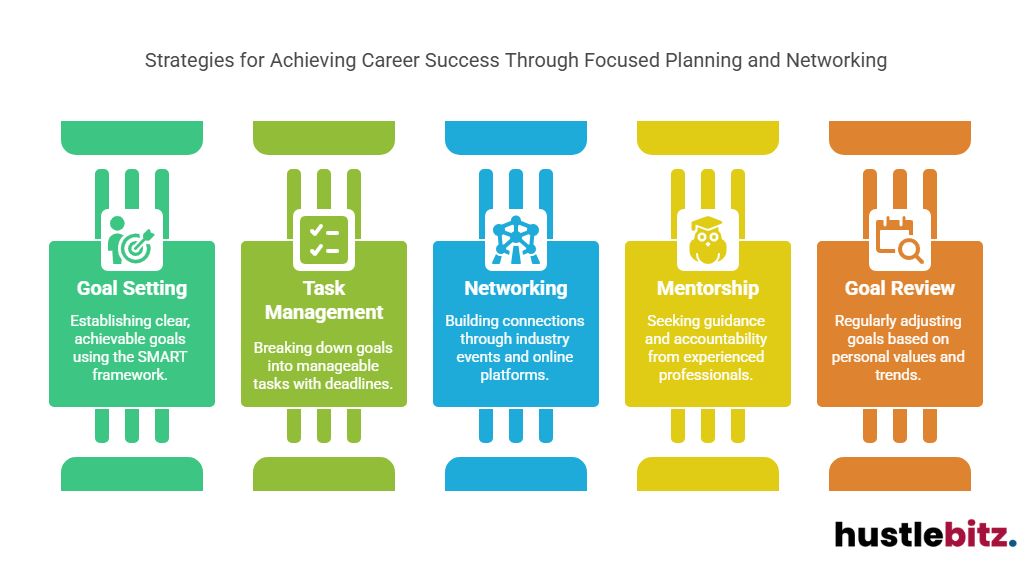To set SMART career goals in 30 days, start by defining goals that are Specific, Measurable, Achievable, Relevant, and Time-bound. Break down larger aspirations into manageable tasks to enhance clarity. Establish deadlines and utilize time management tools to maintain focus. Incorporate accountability partners to foster motivation and support. Regularly assess and adjust your goals to ensure alignment with personal values and industry trends. Networking and mentorship can further enhance your progress. By following this structured approach, you can create a clear path toward your professional aspirations, and there’s more effective strategies to explore for success.
Key Takeaways
- Define specific career goals using the SMART framework to ensure clarity and focus in your aspirations.
- Break down larger goals into manageable tasks with deadlines to enhance accountability and maintain motivation.
- Engage in networking opportunities by attending industry events and connecting with professionals on platforms like LinkedIn.
- Seek mentorship to gain insights, accountability, and guidance in your career progression.
- Regularly review and adjust your goals based on personal values and industry trends to maintain relevance.

SMART Goal Framework

The SMART Goal Framework is a strategic approach to goal-setting that enhances clarity and focus by ensuring that objectives are Specific, Measurable, Achievable, Relevant, and Time-bound. This methodology is particularly valuable in career planning, as it promotes effective objective setting that aligns with both individual aspirations and organizational needs. By defining SMART goals, professionals can create a roadmap for their professional growth, allowing for targeted skill development that is essential in today’s competitive landscape.
Incorporating performance metrics into the SMART framework enables individuals to track their progress, ensuring that they remain accountable and motivated. Utilizing feedback mechanisms enhances this process, providing insights that can inform adjustments to goals and strategies as needed. Engaging with accountability partners can further strengthen commitment to these objectives, fostering a support system that encourages perseverance and resilience.
Moreover, motivation techniques such as setting short-term milestones or celebrating achievements can sustain enthusiasm throughout the journey. By integrating vision clarity into the goal-setting process, professionals can maintain a strong sense of purpose, ensuring that their efforts are aligned with their long-term career aspirations.
Ultimately, the SMART Goal Framework not only aids in establishing clear and actionable objectives but also cultivates a proactive mindset conducive to continuous learning and adaptation in one’s career. By embracing this structured approach, individuals can navigate their professional paths with confidence and intention.
Set Achievable Career Milestones

Establishing achievable career milestones is essential for maintaining motivation and ensuring steady progress toward long-term professional objectives. By breaking down your career aspirations into manageable steps, you can navigate your path with greater clarity. Start by identifying key areas for skill enhancement that align with your industry trends. This focused approach not only boosts your competence but also prepares you for future opportunities.
Consider setting milestones that involve networking opportunities, such as attending industry conferences or joining professional organizations. These interactions can lead to invaluable connections and mentorship programs that support your growth. Additionally, engaging in mentorship can provide insights into effective personal branding and leadership development, fostering your capabilities while enhancing job satisfaction.
Pursuing professional certifications relevant to your field can also serve as a significant milestone. These credentials not only validate your expertise but also increase your marketability in a competitive job landscape.
However, it is crucial to balance these career pursuits with your personal life. Prioritizing work-life balance ensures that you remain energized and motivated, preventing burnout as you strive for your goals.
Time-bound Success Strategies

Setting specific deadlines for your career goals is crucial, as it creates a sense of urgency that can significantly enhance your focus and productivity. By establishing time-bound objectives, you can improve your time management skills and better allocate resources to meet your goals. Recognizing the deadline importance aids in prioritization methods, allowing you to distinguish between tasks that require immediate attention and those that can be deferred.
To optimize your productivity techniques, consider employing scheduling tools that provide a visual representation of your commitments. These tools can help you block out time for essential activities, ensuring that you remain on track. Additionally, implementing focus strategies, such as the Pomodoro Technique, can enhance your concentration and lead to higher efficiency.
Engaging with accountability partners can further solidify your commitment to your goals. Sharing deadlines and progress with someone who holds you accountable fosters a supportive environment, encouraging you to stay motivated. Incorporating reward systems upon reaching milestones can also bolster your enthusiasm, reinforcing positive behavior.
While pursuing your career objectives, it’s essential to maintain a healthy work-life balance. Integrating motivation techniques, such as mindfulness practices or regular exercise, can rejuvenate your energy levels and enhance overall well-being. By establishing a structured approach that encompasses these elements, you can effectively navigate your career path, ensuring that your time-bound success strategies yield meaningful results.
Break Down 30-Day Goals

Breaking down 30-day goals into manageable tasks can significantly enhance your ability to track progress and maintain motivation throughout the month. By segmenting your larger career aspirations into smaller, actionable items, you create a clear roadmap that fosters engagement and commitment. Daily reflections can help you assess your accomplishments and recalibrate your approach when necessary.
Consider utilizing accountability partners who can offer support and encouragement, ensuring that you stay on track. This collaboration can transform daunting tasks into shared challenges, reinforcing your dedication to personal branding and professional growth. Additionally, incorporating regular skill assessments will enable you to identify areas for improvement and celebrate your advancements.
Integrating motivational quotes into your daily routine can serve as a powerful reminder of your goals and aspirations. These affirmations can inspire resilience during challenging times. Furthermore, scheduling feedback sessions at the end of each week allows for constructive dialogue about your progress and potential adjustments needed to optimize your efforts.
To maximize your time management, create a vision board that visually represents your objectives and milestones. This tool can keep your goals front and center, enhancing your focus during networking events and other opportunities for growth. As you engage with others, remember that your network can provide valuable insights and support as you work toward your career aspirations.
Track Career Development Progress
Tracking career development progress involves systematically evaluating your achievements and areas for growth to ensure alignment with your long-term professional goals.
To effectively monitor your professional journey, consider implementing structured career assessments that can provide insights into your skills, competencies, and emotional intelligence. These tools help you identify both strengths and areas for skill enhancement, enabling you to make informed decisions about your next steps.
Engaging in mentorship opportunities can also be invaluable. A mentor can offer guidance and feedback mechanisms that highlight your progress while providing constructive criticism. This relationship can foster accountability, encouraging you to stay on track with your career objectives.
Additionally, leveraging networking strategies is essential. Regularly connect with industry professionals to stay informed about industry trends and potential job opportunities. This not only enhances your personal branding but also opens doors for collaboration and learning.
Performance reviews are a key component of tracking progress. Utilize these evaluations to reflect on your accomplishments and to set new targets.
Establishing a work-life balance is crucial as well; it ensures you remain motivated and productive while pursuing your goals.
Align Goals with Relevance
Ensuring that your career goals align with your personal values and the demands of your industry is essential for maintaining motivation and relevance in your professional journey. Goal alignment not only fosters a sense of purpose but also enhances professional relevance by ensuring that your aspirations resonate with current industry trends.
To achieve this alignment, consider the following aspects:
| Aspect | Importance | Actionable Steps |
| Personal Values | Guides decision-making | Reflect on your core beliefs and priorities. |
| Industry Trends | Keeps goals relevant | Research emerging trends and adapt accordingly. |
| Skill Enhancement | Prepares for future opportunities | Identify skills needed and pursue training. |
| Networking Strategies | Builds professional connections | Attend industry events and engage on platforms like LinkedIn. |
| Mentorship Opportunities | Provides guidance and insight | Seek mentors in your field for advice and support. |
Final Thoughts
Setting SMART career goals within a 30-day framework provides a focused, strategic approach to achieving professional success. By breaking down larger objectives into manageable tasks, you enhance clarity and motivation. Incorporating tools like networking, mentorship, and time management techniques supports steady progress while ensuring alignment with personal values and industry trends. Regular assessments and adjustments keep your goals relevant and achievable. Ultimately, by following this structured approach, you can unlock your potential and navigate your career path with confidence and purpose, leading to meaningful and sustainable growth.




